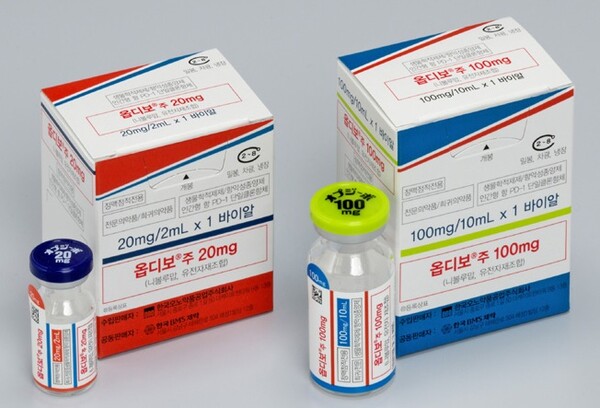Opdivo (nivolumab), an anti-PD-1 immunotherapy, will likely receive insurance benefits soon as the primary treatment of progressive stomach cancer.
The agenda item on expanding Opdivo’s reimbursement passed the fifth drug reimbursement evaluation committee meeting under the auspices of the Health Insurance Review and Assessment Service (HIRA) last Thursday.

In June 2021, Opdivo won approval from the Ministry of Food and Drug Safety for an expanded indication as the primary treatment for patients with progressive or metastatic gastric cancer, gastric esophageal adenocarcinoma or esophageal adenocarcinoma in combined therapy with fluoropyrimidine- and platinum-based chemotherapy, opening a new chapter in immunotherapy for cancer treatment.
It thus emerged as the first treatment option in a decade for the primary treatment of advanced gastric cancer, except for HER2+ patients, after existing chemotherapies.
BMS and ONO Pharma, co-markers of Opdivo, submitted applications for expanding reimbursement as soon as its expanding of indication to gastric cancer. However, they failed to set standards for insurance benefits at a cancer disease deliberation committee meeting in February 2022.
In June of the same year, they succeeded in setting reimbursement standards. They passed the drug reimbursement evaluation committee this month, one-and-a-half years after its passage of the cancer drug deliberation committee.
The current reimbursement standard for the primary treatment of progressive stomach cancer was limited to patients with the PD-L1 (programmed death ligand-1) expression rate of “CPS (a compendium of pharmaceuticals and specialties) five points and higher.”
Opdivo won approval for indication for “all-comers” regardless of the PD-L1 expression rate, but its reimbursement standard has been limited to PD-L1+ patients.
The reimbursement standard was based on the result of the CheckMate-649 study, a phase-3 clinical trial. In this study, Opdivo + chemotherapy significantly improved overall survival (OS) and progression-free survival (PFS) compared to the placebo + chemotherapy group. However, the survival benefits were seen larger in the PD-L1+ group (with CPS five points or higher) than in the entire group (OS hazard ratio (HR) was 0.80 vs. 0.71)
As Opdivo’s reimbursement standard was limited to specific biomarkers (CPS 5 or more) different from its product permit standards, a job to revise its reimbursement for pathology tests concerning its diagnosis will also start in earnest.
PD-L1 pathology text is divided into Companion Dx and Complementary Dx depending on their purpose, and reimbursement is also measured differently.
Experts pointed out that the changes in pathological reimbursement lead to a gap between drug and diagnostic reimbursement, calling for a fundamental solution to resolve this. However, HIRA has yet to devise specific steps to do so.
Accordingly, industry insides pay attention to whether revision in diagnostic reimbursement could end along with expanded drug reimbursement for Opdivo.
Related articles
- ‘Zolbetuximab shows potential as new gastric cancer treatment option’
- ‘Keytruda’s successful clinical trial is good news for stage 4 gastric cancer patients’
- Opdivo-Cabometyx shows long-term effects in primary care of kidney cancer
- How should patients use immunotherapies right to treat stomach cancer?
- 'Joint reimbursement of Opdivo, CDx platform marks milestone in gastric cancer but challenges remain'

